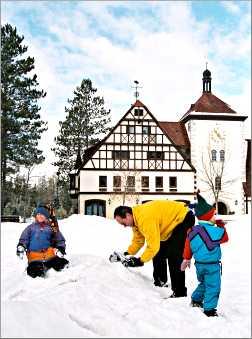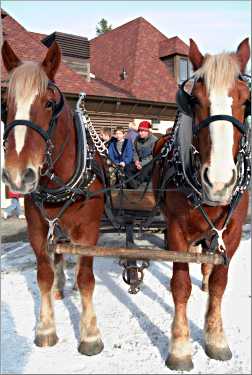Going abroad in Bemidji
At Concordia Language Villages' family weekends, parents get to join the fun.

© Beth Gauper
One winter, I went to summer camp.
It was the German-language immersion village in Bemidji, Minn., to which my daughter went for eight years. She always returned starry-eyed and eager to go back: "I wish I could go there year-round," she'd say, sighing.
I'd always wondered what kind of pixie dust the Concordia Language Villages counselors sprinkled on children. Then Concordia started offering family weekends in winter, and I got to find out.
Sure enough, it was like spending the weekend with Mary Poppins and her pals.
Former German counselor Andy Staab had signed up to be a camper with his three young daughters, but at the last minute Concordia recruited him and two of his friends, who also had signed up with their families, to work as counselors.
Just like that, the grown-up engineer and lawyers became Gustav, Jupp and Theo, singing about elephants in a spider web and balancing on one foot as they made their arms into trunks.
"It's easy to slip into it," Staab said. "You can be a kid all over again."
As soon as we'd adopted German names, the action started. We divided into countries-Germany, Austria and Switzerland-and competed in a rowdy Winter Olympics. We became the characters of "The Pied Piper of Hamlin" and chased each other around the Marktplatz as rats and rat-catchers.
We played soccer, learned how to make apple strudel and went hiking down to Turtle River Lake along the Zwergensumpfpfad, or dwarves' swamp path.
And each family "emigrated," leaving Bremen in 1873 for New York, going through customs and traveling by horse-drawn wagon to the other side of the wooded campus,.
There, Linzer cookies and cider awaited us in a log cabin built by German immigrants in 1862 near St. Cloud and reassembled at the German campus, Waldsee.
In small groups, we conversed in German; my teacher was Staab, who urged us to pronounce the guttural "ch" sound "as if you're bringing something up."

© Beth Gauper
He also led us in such tongue-twisters as "Zwei Zwerge essen Zwieback mit Zwiebeln in Zwickau zwischen zwölf Zürichers," which means, "Two dwarfs eat toast with onions in the town of Zwickau between 12 people from Zurich."
And we ate like Germans-Rouladen and Roesti potatoes for dinner, apple-walnut and chocolate Kuchen for the afternoon Pause and, for breakfast, the tender but chewy Brötchen that are impossible to find in U.S. bakeries.
Once, the counselors turned the dining room into a market, making us "shop" for our lunch by moving from table to table with baskets on our arms, asking for Wurst, Milch, Gemüse, Käse and Brot.
My son Peter loved it and complained he hadn't gotten to shop long enough.
"This is really fun!" he exclaimed. "I'm learning so much Germa- I mean, Deutsch."
Surrounded by the burly sounds of German, in buildings that looked lifted from Germany and in some cases were, we felt as giddy as children playing make-believe.
"It's a Never-Neverland in the summer," my daughter, Madeleine, assured me. "You wouldn't believe it."
Actually, I would.
The winter family weekends have become so popular that now they're offered in fall and spring, and there are whole family weeks in late summer, after the regular camps have ended, and two in June.
There are camps in 10 languages, plus a French voyageurs family week and a Swiss family week. And now, adults have their own camps.
For more, see Language camp for adults.
Trip Tips: Concordia Language Villages
Getting there : The main campus just north of Bemidji is about four hours north of the Twin Cities.
Information : Concordia Language Villages, 800-450-2214.